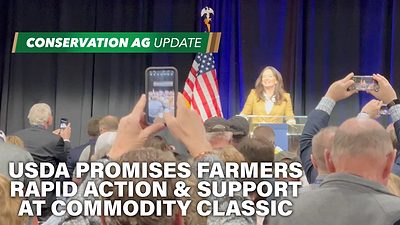I talked with Brad Karlen, a no-tiller from Reliance, S.D., on the afternoon of April 7. Karlen grows peas, lentils, corn, soybeans, winter wheat and spring wheat. Karlen says he saw what was happening in China back in January and February and has tried to plan ahead to alleviate his concerns for his crops.
“If COVID-19 starts messing up the supply chain, I’m concerned about being able to get what I need when I need it,” he says.
Karlen’s experience so far with managing his farming operation while dealing with COVID-19 has been somewhat unique, because several of his employees are from South Africa. Karlen says the employees arrived the week before the U.S. embassy closed in South Africa.
“For our own safety and the safety of our neighbors, we were really careful how we picked them up from the airport,” Karlen says. “We took two vehicles, and they followed us back to the farm. We took them to a pre-stocked farmhouse and I paid them to stay there for two weeks. They were all healthy, but we were trying to be safe than sorry.”
Karlen says that his family and the workers operate as a group, although they try not to interact face-to-face.
“It’s hard as farm workers, worrying about all of us touching the same things,” he says. “It’s hard to do anything, but we look at it as if nobody in our group gets infected, we’re OK.”
Work is just getting started on Karlen’s farm, as the ground is just drying out enough to start spraying and fertilizing.
“The ag industry is doing a good job of dealing with the non-contact issue,” Karlen says. “When we went to the cooperative to get fertilizer, the policy is that we stay in the truck. When our fertilizer arrived from Sioux City, Iowa, the driver didn’t get out of the truck. We unloaded it and they left.”
Karlen sources parts for his equipment from two local John Deere dealerships: C&B Operations in Chamberlain, S.D., and Grossenburg Implement in Pierre, S.D., depending on what he needs.
“They bring the parts out to the back door,” he says. “What they’re trying to do is right, but you can certainly see in the community that not everyone takes it seriously. You’ve got to do it 100%, otherwise it’s going to fail for everyone.”
Karlen is particularly concerned about the virus on a personal level — his 94-year-old mother is high risk, although she still lives alone.
“She stays home, and we’re really careful about taking supplies to her,” he adds.
Looking ahead, Karlen says he’s scared to death of the corn market, but curious to see what the pulse crop market does.
“I feel for the beef guys,” he says. “That’s been ugly, and we’ll see how that will affect the corn market in the long run. Last Friday, the lentil market jumped 3-4 cents overnight. India is having trouble getting in their lentil harvest, with everyone in quarantine. It takes a lot more manpower over there. In some ways, we’re better suited to keep farming here, since we can farm a lot of acres with only 3-4 guys.”






